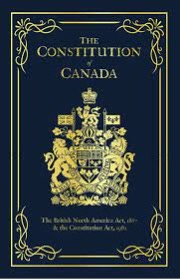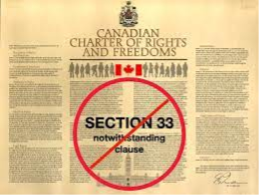
True north strong and free, a mere ceremonial verse in our anthem or an entrenched characteristic of Canadian culture? Surely, while it would be poignant to characterize this sequence of words as antithetical to Canadian identity, it surely is at odds with a particular section of the Canadian Constitution (CA 1982); namely, the Notwithstanding Clause. In this piece we will briefly explain what the Notwithstanding clause is and why it should be a source of concern; then, we will bring forward an account for the potential benefits of the notwithstanding and why removing it would not solve the potential concerns; then, we will conclude with preemptive measures which would prevent its potential mishandling.
What is the Notwithstanding Clause?
The Notwithstanding clause is a derogatory clause which allows for provincial governments to pass legislations Notwithstanding its violations of the Charter of Rights and Freedoms (CCRF). In short, if a law or bill proposed by a provincial cannot pass on its own merit to justify its legitimacy, the Notwithstanding clause may be invoked to allow the provincial government to pass it in parliament. Legislations passed with the Notwithstanding clause supersedes the supreme court, the federal government, and the cherry on top democratic vote is not necessary.
Now you might be wondering which sections of the CCRF can be overridden by the Notwithstanding Clause, the answer is, Yes. The Notwithstanding clause has the power to override sections: 2 (fundamental freedoms), 7-14 (Legal Rights), and 15 (Equality Rights). If the Canadian Charter of Rights and Freedoms was trying to seduce a potential suitor by regurgitating its performative content, the Notwithstanding Clause is the genius janitor who got her number right from under you and asked you if you like them apples while pointing the finger (Good Will Hunting reference).
Notable examples of its invocation are (unsurprisingly) mostly centralized in Quebec. In fact, Quebec’s government invoked the Notwithstanding clause on every piece of federal legislation in opposition to the Charter of Rights and Freedoms which they still haven’t signed, as they believed, infringed on their sovereignty. The irony of it all is while Quebec continuously renounces its commonality to the Rest of Canada, they invoke the Notwithstanding clause which is only legitimatized at the federal level. Admittedly, these initial invocations were merely a political coup, Quebec had and has a bill of rights which protects citizens and guaranteed right and freedoms outside the CCRF; however, Quebec would soon seize their distinction from the rest of Canada to enact some of the most egregious laws in recent Canadian history. Bill 101 and Bill 96, two legislations passed through the invocation of the Notwithstanding clause as their content undermined the official languages act in the constitution. Furthermore, Bill-21, the very controversial bill prohibiting wearing and displaying religious symbols in public positions also needed the notwithstanding clause to come about as it is self-evidently unconstitutional.
Consensus
Various political and legal scholars have outcried the need to reassess the Notwithstanding Clause for the clear trajectory and propensity of government (namely, Quebec) to regard rights and freedoms as an inconvenience. One such scholar happens to be the dean of McGill’s faculty of Law Robert Leckey who states there is a clear paradigm shift in how governments see rights and freedoms now being seen as arbitrary whereas they were to be protected and guaranteed prior. Constitutional Lawyer Julius Grey also denounce the various uses of the notwithstanding clause by the Quebec government on the basis that they have no reason to exist. The weaponization of Quebec’s identity to justify invoking the Notwithstanding Clause to impose a customary homogenous ethos which no longer represents the current reality of Quebec’s demographics. Contrary to constitutional scholars such as Peter Hogg originally thought, the clause would be invoked in controversial manner and political opposition never shun away Quebec government from invoking it. Hence the need to reassess what we should do to prevent the erosion of chartered rights and freedoms at the hands of ideologically fueled governments.
What do Should we do?
The answer isn’t as simple as getting rid of the Notwithstanding Clause. While Quebec’s previous and current invocations are highly problematic and constitutionally alarming, no other province would be easily able to follow Quebec’s path as they do not have the distinct nation status to legitimize them. The Notwithstanding Clause, in respects to the division of powers, can serve as the last line of defense on matters where the federal government oversteps their bounds or are acting in a way that is contrary to good governance (whatever that means … No really good governance is not defined in the POGG clause). Hence, repealing the Notwithstanding Clause while being politically unfeasible would be equally dangerous by leaving provincial legislatures unable to defenseless against a perceptual tyrannical law.
Instead, we propose a bi-conditional requirement to the invocation of the Notwithstanding Clause to mitigate the ability and propensity of legislatures to invoke it. First, the given legislation cannot be ideologically, culturally, or customary charged, therein, a given province’s distinct status cannot be used as justification whereby other provinces devoid of such distinction could not. Second, if a legislation is to affect the chartered rights and freedoms of any citizen then there should be a democratic vote of the populace of the given province as it is their right to have a say in the state of affairs. Therefore, for the bill to pass the second condition, it must receive a supermajority of votes in favor (ie; ±75%). Admittedly, we would refrain from applying the bi-conditional requirement in instances where a legislature were to invoke the Notwithstanding clause to expand rights and freedoms of its citizens; the bi-conditional is to be strictly applicable to invocations which would restrict them.
It is time to spread awareness around this ticking time bomb, and assure Canada remains the true north, strong and free it is globally recognized as. Readers are encouraged to contact their local MPs about the bi-conditional proposition we have brought forward, which may prompt a memorandum to parliament on amending the Notwithstanding Clause. Furthermore, we encourage readers to share this post to spread awareness of the Notwithstanding Clause in hopes of inciting a pan-Canadian awakening to the alarming feebleness of their rights and freedoms thanks to the current state of the Notwithstanding Clause.








